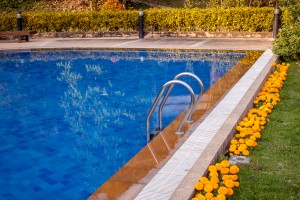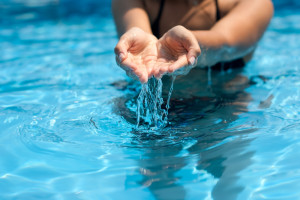Cleaning Your Pool After Inclement Weather

When you own a pool, it helps to have general knowledge of and healthy respect for the unpredictability of weather and nature. When storms blow branches, leaves and other debris into your pool, knowing how to handle the situation yourself can be both efficient and cost-effective. Time can sometimes be a concern, as after a storm, you’ll want to prevent algae growth by adding chlorine to the pool as soon as possible. Of course, the pool technicians at A Better Pool Service can restore your pool to its previous glory after any winter storm or other inclement weather.
List of Pool Cleaning Supplies
If you’re new to owning a pool, you’ll want to gather some general supplies. Remember, while tedious, maintaining your pool has its benefits. Though you’ll have to make an initial investment with the supplies, you’ll save money in the long run. Gather these supplies:
- Telescopic pole
- Leaf net or skimmer
- Pool brush
- Vac head and hose
- Pool chemicals
- Water tests
Balanced water chemistry is the goal of proper pool maintenance, and a weekly routine helps with that. Designate one day every week to clean the pool during seasons of high use, and up to two days per month during seasons of low to medium use. You’ll learn how to balance, chlorinate, and shock your pool and add algaecide. First, remove large pieces of debris from your pool. If a storm knocked large branches and poolside furniture into the water, remove these before starting.
Balance It Out
A properly balanced pool has the right pH level, calcium hardness, and total alkalinity levels. Maintaining these levels at least monthly means a beautifully balanced pool ready to welcome you and your family. Balancing the chemicals in your pool helps protect your metal equipment and plaster surfaces and accessories from etching and corrosion.
Additionally, keeping a clean, perfectly balanced pool prevents eye and skin irritation and cloudy water, and saves pool equipment from scale formation and stains.
Not sure how to test your pool’s water? Don’t feel like doing maintenance on your pool? Call A Better Pool Service at (214) 347-8016. We’ll get your pool up to specs.
Find out which chemicals are off [by testing the water.] Make sure your water tests are of good quality that checks and helps you track pH levels, chlorine, and total alkalinity.
Chlorinate Your Pool
For proper sanitation, your pool’s chlorine level should consistently fall in the 1 to 4 parts per million (ppm) range. This range ensures that your pool is clean and safe from bacteria and algae. There are many options you can take to properly chlorinate your pool. You can try slow-dissolving chlorinating tablets, which have a stabilizer to protect the chlorine from burning off in the sun. Chlorinating tablets work best when dropped into a skimmer, floating dispenser or automatic chlorinator.
 Similar to household bleach, you could also use liquid chlorine. While it is an effective sanitizer and easy to use, be sure and get the proper amount for your pool, as it has a very low shelf life compared to other products. If your pool is seeing high use, and you’re cleaning it weekly, you should be able to carry the leftover liquid chlorine to the next treatment, as you can only store it for a few weeks at most.
Similar to household bleach, you could also use liquid chlorine. While it is an effective sanitizer and easy to use, be sure and get the proper amount for your pool, as it has a very low shelf life compared to other products. If your pool is seeing high use, and you’re cleaning it weekly, you should be able to carry the leftover liquid chlorine to the next treatment, as you can only store it for a few weeks at most.
For a do-it-all-at-once solution, try chlorinating granules. These products can perform several pool maintenance tasks at once. While they vary from brand to brand, chlorinating granules shock, chlorinate and kill algae with a daily application.
Shock It!
When chlorine enters a pool, it bonds with ammonia and nitrogen compounds to help clean the pool. The dirtier the pool is, the lower the amount of free chlorine available. Shocking your pool increases the amount of unused chlorine in your already chlorinated pool. Shock your pool every week to rid it of contaminants that cause odor, cloudy water and skin and eye irritation.
There are two types of shock products for proper pool maintenance. Basic shock products kill bacteria and help disintegrate cosmetics like suntan lotions, sweat, deodorants and other swimmer byproducts that the pool’s filter can’t handle. Basic shock products keep your pool clear and reduces eye irritation.
Much like its name suggests, multifunctional shock products do more than the bare minimum of basic shock products. They destroy swimmer byproducts and bacteria while balancing pH levels, aiding filtration, and further protecting your pool against algae. What’s more, multifunctional shock treatments do all this work extra fast, some of which work effectively after only 15 minutes.
Add Algaecide
Algae are microscopic plants that can grow fast and quickly destabilize the balance of your pool, clog filters and reduce the effectiveness of your pool chemicals. Prevention is key, since an algae infestation can be difficult, time-consuming and expensive to control and remove. Algaecides help keep algae from taking over your pool by stunting its growth as soon as applied. Some algaecides kill multiple types of algae and keep them from returning with regular (read: weekly) applications. If you’re properly testing your water at least monthly, you’ll be able to tell when algae is on the rise. Catch an algae outbreak before it becomes a bigger issue with algaecides.
Leaf Net
In this last step, get out your pole and leaf net and get ready to work your arms. Skim debris out of the pool on a daily basis, especially when the pool use is high and in season. The first time doing this might prove to be the most difficult, as you get used to using the pole and fishing debris out of the pool. The more you do it, the easier it’ll be and the faster you’ll finish this task. Clean skimmer baskets once you’re done.
Next, hook up your vacuum and use the brush ends to scrub the walls and floor. Use pool manufacturer recommendations for pool cleaners and brushes. Begin at the shallow end and move onto the deep end, overlapping each stroke during the vacuuming and brushing process. Make sure the vacuum head stays underwater and brush thoroughly, then hose down the pool area once you’re done. Be sure to direct the hose spray away from the pool to prevent runoff.
Repeat this process at least twice a month for the cleanest, clearest, most balanced pool that will incite jealousy from your neighbors, especially the ones without a pool. Don’t feel like doing all this yourself? Call A Better Pool Service. We can schedule weekly or monthly pool maintenance so you don’t have to do all the work yourself. We’ll have your pool clear, blue and perfectly balanced all year long.
When inclement weather hits your town, it can leave your backyard and pool area in a total shambles. Branches, leaves and other runoff are a breeding grounds for algae infestations that can turn your pool green and unswimmable. Learning how to maintain your pool will help ensure that you can have as many swim days this summer as possible.

